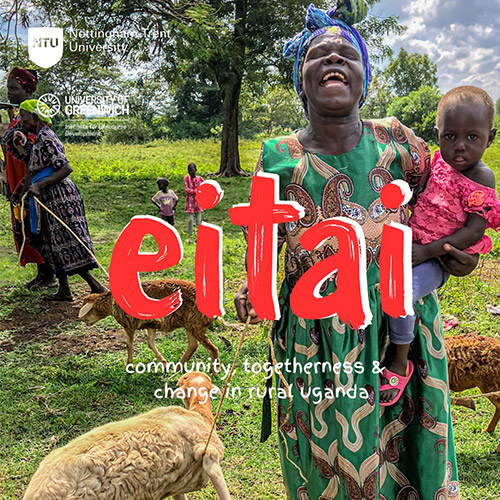What is 'EITAI', and how did you get involved?
Eitai is a documentary I wrote, directed, and co-produced to share the findings of my PhD research. It explores the lives of a rural community in North-Eastern Uganda, focusing on interconnected issues like climate change, poverty, alcoholism, and gender-based violence. Eitai, an Ateso word meaning “community togetherness” shows how social and familial connections create economic opportunities and safe spaces for dialogue through both work and creativity.
Teso has a rich storytelling culture. During my fieldwork, participants used performance to express their experiences, so film felt like the right way to honour their voices. With a £5,000 grant from Nottingham Trent University and support from filmmaker Sonyanga Ole Ngais, we had just three weeks to turn a 400-page thesis into a film. After much reflection, I realised the story was about the spirit of community resilience, embodied in the Ugandan maxim eitai.
What effect has your choice of medium had on the impact of this project?
Using film allowed us to amplify these community voices far beyond academic audiences. We’ve managed to broadcast the message of Eitai to over 1,000 people across cinemas, conferences, schools, and even in UK Parliament. It was even shortlisted for the ISA Film Festival in Rabat. Most significantly, screening the film to the community in Teso was deeply moving, not only did they see themselves on screen, but they saw the value that their stories have through the eyes of others.
Following the local screening, the four NGOs featured in the film (including TASO, Soroti) began collaborating, which is especially vital given recent cuts to international aid. This is eitai in action. Audience interest has also led to the development of an Eitai website advocating for indigenous voices and climate justice.
How has this experience shaped your future research ambitions?
While I still value academic publishing, this project has shown me the power of storytelling to engage wider audiences. I’m now working with colleagues at the University of Greenwich to develop new projects that centre documentary film as a means of research dissemination.
There are so many untold stories, especially from communities already responding to climate and social challenges. I hope to continue using film to amplify these voices and support alternative development models based on listening and mutual learning.
What advice would you give to someone considering a similar project?
First, budget carefully. I was fortunate that my filmmaker and editor worked voluntarily, but costs like licensing and translation can add up. The process was time-consuming—almost as demanding as writing a PhD.
Start with a clear vision: know your goals, identify the footage you need, and define your key messages early. Atmosphere is crucial, include shots that show daily life and the natural environment. In Eitai, we also recorded local music, which grounded the film both sonically and culturally.
Most importantly, build trust. I’ve worked in Teso for over a decade, and those relationships made a big difference. Listen carefully, open-ended questions and silence often lead to the most meaningful stories. These are the voices that matter most.



